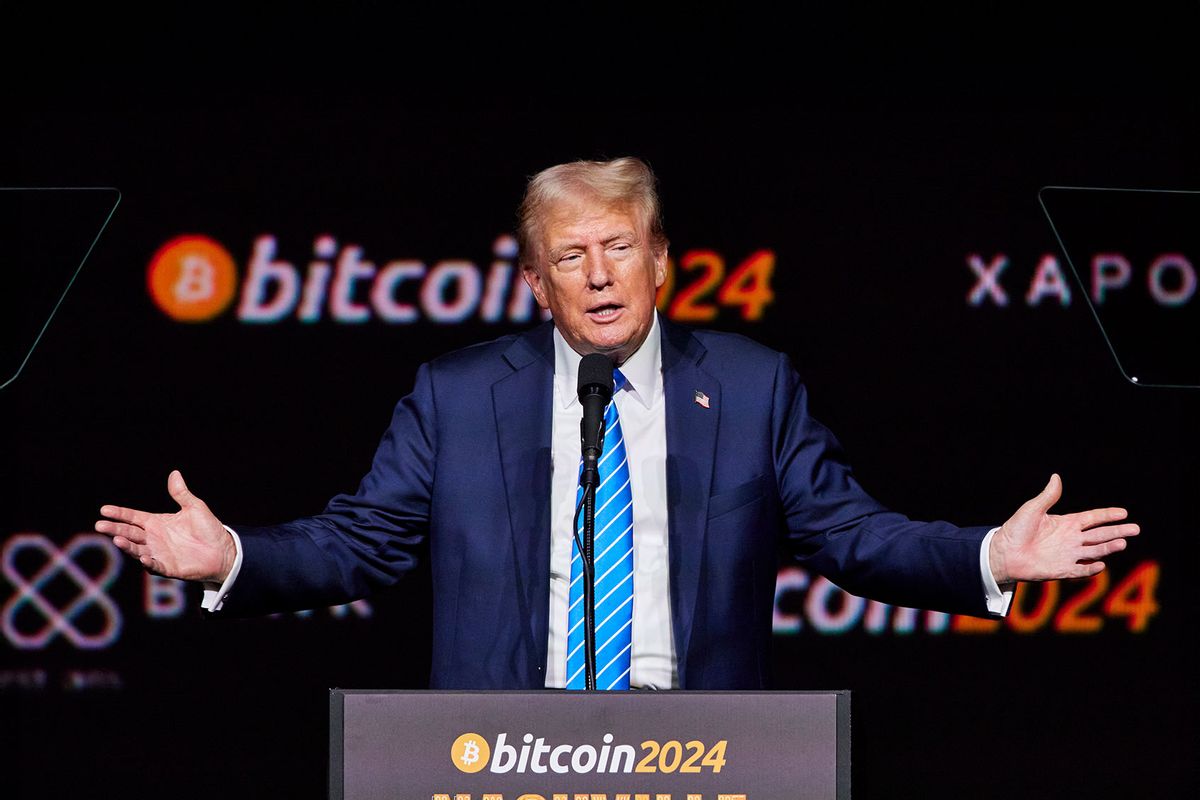President Trump, a crypto skeptic in his first term, touted the United States as a "bitcoin superpower" at the Blockworks Digital Asset Summit in New York City last week. But his second administration's embrace of crypto, and its shift toward deregulation, comes as the number of scams is set to increase.
Crypto investors lost at least $9.9 billion last year as a result of scams, according to the latest data compiled by Chainalysis, a New York City-based blockchain analysis firm. That estimate is expected to rise as more illicit addresses associated with fraud are identified in the coming months.
Eric Jardine, a cybercrimes research lead at Chainalysis, told Salon the increase is likely to be driven by more consumers using crypto and scammers using AI advancements to trick victims.
“Adoption, a driver of total crypto activity, will undoubtedly grow this year, so even if the rate of scam activity were to remain constant, scam volumes would still increase year-on-year,” Jarine said. “I also expect that we will see volumes surge due to the growing professionalization of the ecosystem and the proliferation of AI technologies."
Days after taking office, Trump signed an executive order promoting the development of crypto and a task force to create a regulatory framework and possibly a national crypto stockpile controlled by the government. While this friendlier approach might encourage legitimate crypto businesses, it could also create more opportunities for scammers to exploit the growing market.
What does this mean for consumers? Regardless of the level of regulation or which political party is in power, awareness remains their best defense, according to experts.
We need your help to stay independent
“The expected absence of enforcement in the cryptocurrency market does not mean there are no legitimate issuers and products; it means the illegitimate ones may multiply and the maxim ‘buyer beware’ takes on greater importance,” said Terence Grugan, a Philadelphia-based attorney at Ballard Spahr. “As with any investment or any product with a fluctuating value, buyers and users should seek as much information as possible about the product before exchanging their own hard currency for crypto.”
Types of crypto scams
Crypto scams can be simple or sophisticated. On the more elaborate end, Ponzi schemes trick investors into believing that legitimate activities are fueling high investment returns. Scams can also be as straightforward as urging consumers to take cash from their bank accounts and put it into a bitcoin ATM.
In so-called "pump-and-dumps," scammers artificially inflate the value of a token to attract more buyers, then cash out by selling them to investors.
In a "rug pull," coin owners sell their shares of a coin for a big profit while tanking its value for other coin holders. Haliey Welch, known as the “Hawk Tuah Girl," was accused of a "rug pull" in December after her meme coin surged to a market cap of $500 million before crashing to below $60 million in 20 minutes. (Welch denied the accusations.)
"Pig butchering" — schemes that involve establishing online relationships before conning someone into sending crypto — accounted for 32% of digital asset scams last year, according to Chainalysis.
"Not engaging with unsolicited messages is a helpful avoidance technique that is easy to implement"
“The common starting point is usually a message via SMS or social media, which comes from a person that you do not truly know. The relationship builds from there until it reaches that pivot point where a request for money is made,” Jardine said. “Not engaging with unsolicited messages is a helpful avoidance technique that is easy to implement.”
Precautions you can take
Despite these risks, the majority of crypto owners expect the value of their crypto investments to increase during Trump’s second term and are confident in the security of crypto assets, according to the 2025 Cryptocurrency Adoption and Consumer Sentiment Report compiled by Security.org.
Still, it's crucial to take the basic steps to protect yourself.
Key precautions include using secure crypto wallets with two-factor authentication and being wary of too-good-to-be-true, high-yield investment schemes promising guaranteed returns. Consumers should also avoid engaging with unsolicited messages from unknown senders.
Another suggestion is to buy crypto through exchanges that have strict reporting requirements. Some of these include the New York State Department of Financial Services, according to a Wall Street Journal article that cited Howard Greenberg, president of the American Blockchain and Cryptocurrency Association.
Experts also advise verifying the authenticity of emails and websites before sharing sensitive information, and using only trusted networks when accessing your crypto wallet.
"If you don’t understand the product, don’t invest in it"
When it comes to storing your private keys or the codes necessary to access crypto assets, you may need a hardware wallet — also known as a "cold wallet" — for offline safety. You also need a safe way to store your “seed phrase" — a sequence of words generated by a crypto wallet that allows you to recover your private keys. It's a good idea not to share the phrase with anyone.
Common sense goes a long way, too.
“If you don’t understand the product, don’t invest in it,” said Ira Rheingold, executive director of the National Association of Consumer Advocates, who has testified before Congress on consumer finance issues.



Shares